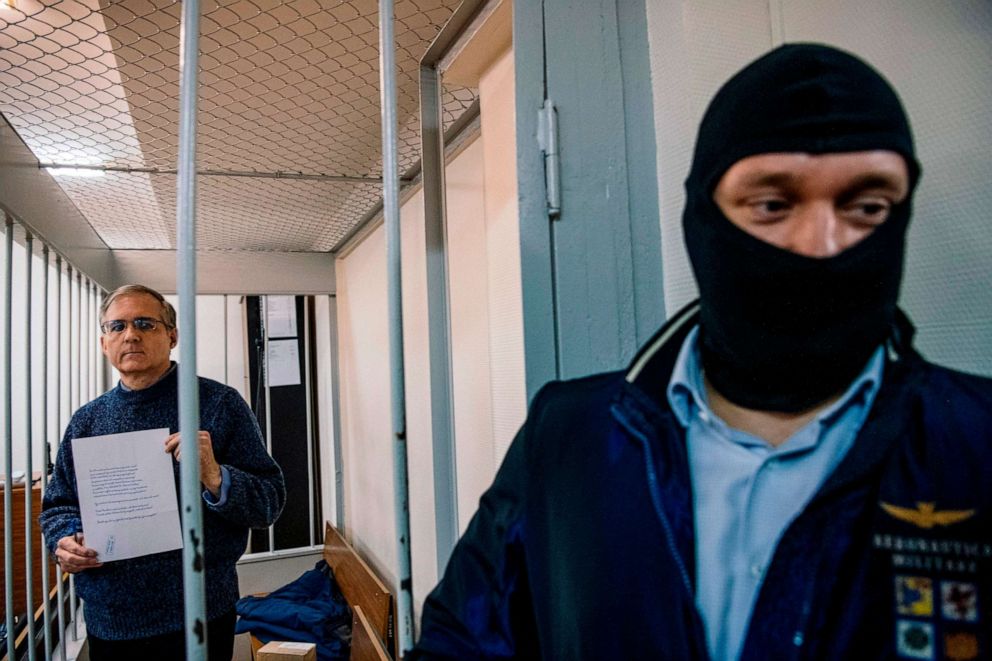Trial of Paul Whelan, ex-Marine held in Russia, begins
The trial of Paul Whelan, the former United States Marine held on espionage charges in Russia, formally opened on Monday, more than a year after he was first seized by Russian security services.
Whelan, a security director for the American auto parts manufacturer BorgWarner, was detained in his hotel room close to Red Square by agents of Russia’s domestic intelligence agency, the FSB, in late December 2018. Russia has never publicly elaborated on the accusations against him and Whelan’s family and American officials have accused the Russian government of holding him on baseless charges.
The U.S., Irish and British ambassadors took the unusual step of attending the opening hearing on Monday, a show of strength for Whelan. He also holds British, Irish and Canadian citizenship.
Speaking to reporters outside the courtroom at Moscow’s City Court, U.S. ambassador John J. Sullivan called it a “sad day” and said there was “no evidence to justify” Whelan’s continuing imprisonment.
"I am hoping that, as this process moves forward, we see a fair and transparent judicial process. Every person, every citizen, of every country in the world, deserves that,” Sullivan said.
The start of the trial opens a new stage in Whelan's case, who has spent 15 months in Moscow's Lefortovo jail. Whelan, 50, was detained while in the city for a friend's wedding, according to his family, who have accused Russia of taking him hostage. During his detention, he has complained that he has been denied almost all contact with his relatives as well as medical care.
The trial is treated as top secret by the Russian authorities and is expected to take place behind closed doors. The three ambassadors spoke with Whelan on Monday at the courthouse, according to U.S. embassy spokeswoman Rebecca Ross.

The judge on Monday again extended Whelan’s trial detention by six months, according to his Russian lawyer Vladimir Zherebenkov. The next hearing where elements of the case will be considered is scheduled for March 30 but could be pushed to April 13 if new restrictions prompted by the coronavirus epidemic are extended.
Whelan’s lawyers have said there is nothing in the case materials that prove Whelan was engaged in espionage. Instead, they said he was framed.
They allege he was set up by a long-time Russian friend collaborating with the security services. The friend, according to them, planted a memory card containing classified materials in the pocket of Whelan’s bathrobe while he was getting dressed in his hotel room. Minutes after the friend left, FSB agents burst in and detained him. The espionage charge carries a maximum sentence of 20 years prison.
Whelan, who was dishonorably discharged from the Marines in 2016 over fraud allegations, is a long-time Russophile and has visited Russia repeatedly as a tourist over the last decade, according to his family. One of his friends who Whelan had vacationed with in May 2018 set him up, his lawyers said.
His lawyer, Zherebenkov, said the prosecution intends to call 13 Russians whom Whelan had contact with as witnesses. He said that Whelan’s defense plans to ask the U.S. and other ambassadors to testify that it was impossible Whelan had been serving in American intelligence since he held multiple citizenships.
Whelan’s family say they believe Whelan was seized as a bargaining chip, perhaps to seek an exchange for Russians held in the U.S. Former and current U.S. intelligence officials have also said the case shows hallmarks of a set-up, typical of the KGB during the Cold War.
The case has come amid heightened between the U.S. and Russia when American officials fear U.S. citizens could make targets for Russian security services. This month the family of a second former Marine held in Russia, Trevor Reed, said they increasingly feared authorities were manufacturing a case to hold him.
Whelan’s second Russian lawyer, Olga Karlova, last week told ABC News she expected his trial to last at least three to six months. She said that Whelan was glad the trial was finally beginning because it could be another step closer to his going home.
Tanya Stukalova and Alina Lobzina contributed reporting from Moscow.





